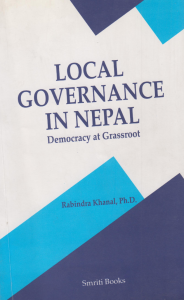–Professor Rabindra Khanal, Kathmandu, Nepal
Introduction to the study:
The concept of local governance has emerged as a significant issue in the process of democratization.
The third wave of democracy, mentioned by Huntington, has brought new challenges to the existing systems around the world for greater participation of the people in decision making processes which affect their life.
The advancements in information technology in the recent years have, moreover, made people realize their importance in society prompting them to contemplate on the locus of power and its applications.
People have even started questioning the validity of representative democracy in serving them at the grassroots because of its failure in mediating between the centralized state and the people in general and its inability to ensure their participation in the process of development in particular.
Local governance in this context can best provide a way out for the empowerment of people in the society and create an environment for local democracy.
The old attitude of the central government actors that they alone knew about development and that their answers to development problems were always right have been displaced by the growth of local knowledge and willingness of the local people to be involved in governance.
This new phenomenon in the political and developmental process has necessitated the reemergence of an alternative concept of participatory democracy.
Democratic governance around the world started taking roots after World War II but soon faced new internal and social challenges.
It was adopted by many countries either as an alternative to the Soviet model of communism or to satisfy the revolutionary zeal of the newly independent countries of the world.
But as international conflicts widened, they could neither remain isolated from the Soviet influence nor could meet the aspirations of the people.
This apart, the Third World countries could not compete with the developed countries as the latter went ahead with full force in industrialization and economic growth.
They did not have the basic infrastructure for development and modernization.
They even lacked the necessary background and roots for democracy.
As a result, the experiments in democracy failed in almost all the new countries giving way to military dictatorship or authoritarian regimes.

The Third Wave emerged in the mid-seventies and in its first phase it tried to strengthen the nation-state system without giving priority to such aspects of democracy as the empowerment of people and their involvement in the process of governance at the grassroots.
State governments were considered as the most important actors in transforming society and so, the international institutions and development agencies entrusted these tasks to them.
Their capabilities were increased and strengthened to deal with the development problems in many parts of the world but the results were otherwise.
They proved incapable in transforming the society economically, socially, and politically. And so, they failed in their development efforts.
The present phase of the third wave of democracy emerged in the late 80s under a totally different framework.
It aroused people to launch democratic movement in different parts of the world, made them conscious for democratic values, and created a situation of openness.
It became more and more clear that the state is not the only or the best agent to deal with the problems of underdevelopment, poverty, unemployment, and inequality.
This became obvious with the fall of the Soviet Union in 1991.
The Third World, with its array of problems, felt that the involvement of local communities could only gear up the process of development, without minimizing the role of the state even if the latter had failed in various parts of the world.
With this presumption the third world countries started to give priority to people’s participation in their development efforts.
They began realizing that people’s participation is the key to ensuring efficiency, effectiveness, and sustainability in development.
The national governments must find ways to enable people to participate in government and exert greater influence on decision making processes that affect their lives.
If this is not done, the tide of people’s rising aspirations would inevitably clash with the rigidity of the prevailing system, which might lead in many and chaos.
The solution rests on rapid democratic transition and strengthening of civil society.
Among the many specific steps that must any such a transition, the two main ones are decentralization of authority to local governments and more freedom to people’s organizations and non-governmental organizations.
Increasing globalization of political economy has become another major challenge to the third world in their development efforts.
The process has not only weakened the position of the state as a provider of goods and services but also has pushed it to compete with the market forces.
The present status of economy of the developing countries may not be able to cope with the process of globalization with its varied demands, especially in competing with the global market, but at the same time it cannot be ignored as it has already taken the third world in its grip.
Thus, to face the challenges of globalization, the developing countries may have to adopt a middle course between the globalized market process and indigenous political process with more social control and effective participation.
In most developing countries the markets are still imperfect and the governments are weak and inefficient, which means that they should both work together leaving some space for both the market and the state.
In order to maintain a balance between the market and the state, the former needs to be engaged in the promotion of the economy whereas the state has to assist in distributing the growth.
People’s participation through local governance and indigenous organizations may eventually cope with the globalization process and maintain a balance between the market and the state.
Participation means that people are closely involved in the economic, social, cultural, and political processes that affect their life.
People may, in some cases, have complete and direct control over these processes.
In other cases, the control may be partial or indirect.
The important thing is that people have constant access to decision-making power.
People’s participation is certainly an effecting tool in combating the increasing process of globalization and restoring the role of state but some other strategies also need to be considered.
The domestic institutions need structural adjustment in strengthening the state against its decline.
The socio-economic and political organizations that exist need to be be institutionalized democratically for their better performance because political institutionalization is the bedrock of a country’s development and governance.
But what is political institutionalization?
Political institutionalization refers to a system of the rule of law, sustainability of political participation, smooth transition of political power, and the application of rational development policies for social justice.
According to Huntington, political institutionalization is the “process by which organizations and procedures acquire value and stability”, and “the level of institutionalization of any political system can be defined by its adaptability, complexity, unity and autonomy”.
Institutionalization of democratic institutions is a precondition for decentralization and local governance.
But it is also heavily dependent upon the political culture of the country.
If political culture is not developed, neither institutionalization nor participation can be effective.
Immature political culture demands no accountability from the leaders and leaves enough scope to run the system on their whims as a result of which democratization becomes difficult.
Institutions revolve around the personality rather than taking due course under some set rules and regulations prescribed by the social norms.
The lack of institutionalization also hinders transfer of power. Local governance as the primary level of governance should get its share of power for both democratization and development.
Another major issue that most of the third world countries face today is the issue of defining development itself.
Is it something different from what is being perceived throughout the history?
If so, the third world countries should have been in complete stagnation and they should have never reached the present status.
Developing countries have their own norms, values, and culture which are different from those of the West. Development certainly is not westernization.
The misconception about development in the Third World has cost them tremendously.
The people of third world countries have idolized the West as their role model in various aspects of life including development mechanism.
The monolithic concept operates at the cost of national identity and tradition, values, customs, and norms.
What is development for the Third World is not exactly as the West has perceived.
The developing countries must redefine development and decide strategies to materialize the objectives suitable for their overall progress.
They are rich in tradition for carrying out socioeconomic and political development, but the traditions must be revitalized to enable them to cope with the demands of the society.
The indigenous institutions should be reactivated to achieve the goals of social liberation.
People’s realization of their power and position in the society helps them achieve self-reliance, self-governance, and self-fulfillment by making the power holders more accountable for which decentralization of power is the fundamental prerequisite.
Accountability, as the essential integrant of good governance, is another major attribute of local governance.
In the context of modern state, it has two major implications.
First, those who hold office must show that they have exercised their powers and discharged their duties properly.
Secondly, there must be some arrangement for securing conformity between the values of a delegating body and those of the person to whom the powers and responsibilities are delegated.
Accountability increases the capability of the system and makes it possible to allocate the resources and values for the majority of the poor people at grassroots and provides them with a sense of belonging to the system.
But accountability can be fostered only through a properly managed process of decentralization, especially by the devolution of power and authority.
Local governments with devolution of power should be able to resolve most of the problems and create environment favorable to the functioning of democracy at grassroots.
In this regard, markets need to be reformed to offer everyone access to the benefits they bring.
Governance needs to be decentralized to allow greater access to decision making.
And community organizations should be enabled to exert considerable influence on national and international issues.

Democracy has no meaning unless it reaches the doorstep of every individual.
Under a democratic regime, people’s participation can overcome a lot of problems that occur in the third world countries.
It can also cope with issues like poverty, under development and exploitation and resist the pressures coming from outside the state territory.
In the case of Nepal, the People’s Movement of 1990 brought about the downfall of the Panchayat system and restored multiparty democracy characterized by political pluralism, civil liberties, free press, competitive elections, and open climate for business.
The third wave of democracy which had played its role around the world did affect Nepali politics.
It not only helped in bringing liberal democracy but also revived the fundamental concepts of democracy such as local governance and decentralization.
The initiatives on decentralization taken by the state can be analyzed through a number of approaches that are interlinked together.
Some of them can be adopted as alternative models for economic and social development of the country.
# Text courtesy: From the book “Local Governance in Nepal, Democracy at Grass root” published by the Smriti Books ( 2006) and authored by Professor Rabindra Khanal.
# Thanks to the distinguished Professor R. Khanal and the Smriti Books: Upadhyaya. N. P.
# Our contact email address is: editor.telegraphnepal@gmail.com

